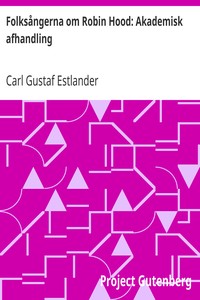Folksångerna om Robin Hood: Akademisk afhandling by Carl Gustaf Estlander
"Folksångerna om Robin Hood: Akademisk afhandling" by Carl Gustaf Estlander is a scholarly publication written in the mid-19th century. The work delves into the historical and cultural significance of the legendary figure Robin Hood, exploring his representation in folk songs and traditions, as well as the societal context that surrounded his tales. The author critically examines various historical opinions and theories regarding Robin Hood’s character and legacy. The opening of the publication
introduces Robin Hood's legacy by highlighting the continued reverence for his tales in rural England, where folk songs celebrate his adventures alongside Maid Marian and Little John. Estlander emphasizes the historical context where Robin Hood was seen as a symbol of resistance against oppression, providing insight into how his image evolved over the centuries through popular culture. He outlines the transition from oral tradition to written accounts, hoping to unearth the character's origins and encourage a deeper understanding of how Robin Hood became a folk hero intertwined with the values and struggles of the English people. (This is an automatically generated summary.)
Read or download for free
| How to read | Url | Size | |||
|---|---|---|---|---|---|
| Read now! | https://www.gutenberg.org/ebooks/51825.html.images | 215 kB | |||
| EPUB3 (E-readers incl. Send-to-Kindle) | https://www.gutenberg.org/ebooks/51825.epub3.images | 170 kB | |||
| EPUB (older E-readers) | https://www.gutenberg.org/ebooks/51825.epub.images | 172 kB | |||
| EPUB (no images, older E-readers) | https://www.gutenberg.org/ebooks/51825.epub.noimages | 140 kB | |||
| Kindle | https://www.gutenberg.org/ebooks/51825.kf8.images | 383 kB | |||
| older Kindles | https://www.gutenberg.org/ebooks/51825.kindle.images | 371 kB | |||
| Plain Text UTF-8 | https://www.gutenberg.org/ebooks/51825.txt.utf-8 | 201 kB | |||
| Download HTML (zip) | https://www.gutenberg.org/cache/epub/51825/pg51825-h.zip | 170 kB | |||
| There may be more files related to this item. | |||||
Similar Books
About this eBook
| Author | Estlander, Carl Gustaf, 1834-1910 |
|---|---|
| Title | Folksångerna om Robin Hood: Akademisk afhandling |
| Note | Reading ease score: 51.8 (10th to 12th grade). Somewhat difficult to read. |
| Credits | E-text prepared by Jari Koivisto |
| Language | Swedish |
| LoC Class | PR: Language and Literatures: English literature |
| Subject | Thesis (Ph. D.) |
| Subject | Robin Hood (Legendary character) -- Legends -- History and criticism |
| Category | Text |
| EBook-No. | 51825 |
| Release Date | Apr 22, 2016 |
| Copyright Status | Public domain in the USA. |
| Downloads | 86 downloads in the last 30 days. |
| Project Gutenberg eBooks are always free! | |

